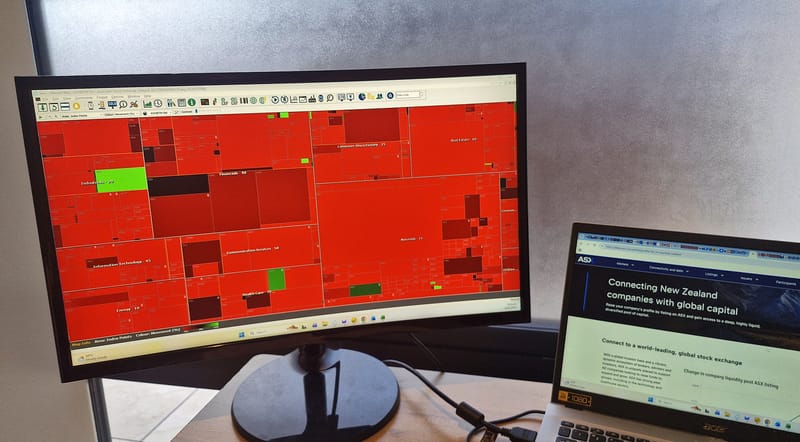Markets brace for another round of tariff tremors amid renewed US-China tensions
Precinct is said to be eyeing a capital injection.

The kiwi dollar sank to a new six-month low and Australian futures are pointing to a soft start to the week in the antipodes after a rout on Wall Street when US President Donald Trump threatened fresh tariff hikes on Chinese products as the superpowers jostle over rare earth minerals.
Against that backdrop, Australian media are reporting Precinct Properties NZ is poised to tap investors for $300 million to fund new development, taking advantage of a 13% rally this year that’s seen its shares trade at a premium to net tangible assets.
The US government’s federal shutdown remains top of mind as Trump prepares to permanently lay off workers, while the Bureau of Labor Statistics is bringing back furloughed people to make sure the Federal Reserve has the latest inflation figures feeding into its next policy review, and investors have the next round of quarterly earnings report to bear in mind too.
And New Zealand’s government settled on a lower 2050 methane reduction target range to avoid overly onerous goals stymieing the nation’s agricultural sector which has been driving the economy.
The song remains the same
The kiwi dollar dropped to 57.23 US cents at 7am in Auckland from 57.56 cents last week, while Australian futures are pointing to a 0.9% slide when the S&P/ASX 200 index opens this morning after markets were rocked by the latest ratcheting up of tensions between the US and China.
Stock markets on Wall Street sank the most since US President Donald Trump’s Liberation Day tariff reveal in April, with the S&P 500 down 2.7%, while the CBOE’s Volatility Index – known as Wall Street’s fear gauge – spiked 32% to 21.66 and gold futures were up 0.9% at US$4,036 an ounce after Trump revived threats to hike tariffs on China over the East Asian powerhouse's restrictions on critical minerals.
After trading closed, Trump then said he would impose an additional 100% tariff on Chinese imports from November and impose export controls on US-made software products.
“With tariffs recently out of the spotlight, the new threat was a shot out of the blue that roiled markets and it sent US equities spiralling downwards, resulting in the S&P500 closing on its lows for the session down 2.7%, unravelling its gains of the past month,” Bank of New Zealand senior markets strategist Jason Wong said in a note. “US-China trade war escalation sets the scene for some volatile trading conditions through the rest of the month.”
Meanwhile, the US federal government shutdown is continuing, with the White House starting to lay off staff permanently, with 4,000 employees at various agencies given notice.
One more time
The standoff is delaying official data ahead of the US Federal Reserve’s policy review later this month, although the Bureau of Labor Statistics is bringing back furloughed workers to make sure the latest inflation data are available for the central bank’s federal open market committee, although it’s unclear whether it will be on Wednesday as scheduled.
US bond markets are closed for the Columbus Day holiday although the New York Stock Exchange is open, with the latest round of quarterly earnings. Analysts project a ninth straight period of earnings growth on a year-on-year basis according to FactSet analysis.
Political uncertainty isn’t limited to the US, with French President Emmanuel Macron convincing Sébastien Lecornu to accept the position of prime minister after quitting less than a week earlier, while Japan’s Liberal Democratic Party will need to cobble together a new coalition after junior partner Komeito said it won’t back Sanae Takaichi as prime minister.
The kiwi dollar fell to 49.25 euro cents from 49.75 cents last week and dropped to 86.73 yen from 87.89 yen.
Local data today include the BNZ-BusinessNZ performance of services index and travel and migration figures for August.
Meanwhile, the government lowered its 2050 methane reduction target to a range of 14%-to-24% below 2017 levels, and scheduled a 2040 review to make sure it aligns with the science and tracks what the nation’s trading partners are doing. Agriculture companies were broadly stronger on Friday, with PGG Wrightson surging ahead of its Tuesday annual meeting.
And the Australian Financial Review’s Street Talk column reported Precinct Properties is poised to raise $300 million to fund new development, and has hired Forsyth Barr, Jarden and UBS to manage the placement. Precinct’s shares have climbed 13% so far this year, and at $1.33 are a premium to the $1.21 net tangible asset value.
Reporting by Paul McBeth. Image from zhang kaiyv on Unsplash.







